Legislation
The Colombian Constitution does not officially establish an ethical duty of society to protect the environment, instead it does mention that people have the right to live in a healthy environment in chapter 3 about, Collective and Environmental rights.
Law 99 of 1993 established the Ministry of Environment, Housing and Territorial Development but simply to guarantee service for humans. Animals were placed as belongings that served humans.
In 2014 and again in 2020, Colombia received a D out of possible grades A,B,C,D,E,F,G on World Animal Protection's Animal Protection Index. [3]
In May 2024, The Colombian Senate approves a resolution banning Spanish-style bullfighting in Colombia. [4]
Penalties
Legal penalties of the interest of animal rights are stipulated in Law 599 of 2000 which ways that the illicit advantage taken of the renewable natural resources will be penalised. Trafficking, commercializing, taking advantage or benefiting of specimens, products or parts of the fauna or flora resources in danger will be penalized with between 2 and 5 years of prison and ten Colombian minimum monthly salaries.
In September 2003 a project or draft to reform Law 84 of 1989 did not pass in the Congress of Colombia. The reform proposed the imposition of legal penalties to those who did not abide by the law.

Environmental protection is the practice of protecting the natural environment by individuals, groups and governments. Its objectives are to conserve natural resources and the existing natural environment and, where it is possible, to repair damage and reverse trends.

Quintana Roo is a state in southeast Mexico established out of the Quintana Roo Territory in 1974 with seven municipalities, which has since grown into eleven municipalities. According to the 2020 Mexican census, it has the twenty-fourth largest population of all states with 1,857,985 inhabitants and is the 19th largest by land area spanning 44,705.2 square kilometres (17,260.8 sq mi).
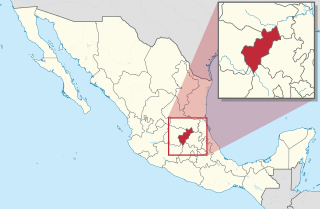
Querétaro is a state in North Central Mexico, divided into 18 municipalities. According to the 2020 Mexican census, it is the twenty-first most populated state out of thirty-two with 2,368,467 inhabitants and the sixth smallest by land area spanning 11,690.6 square kilometres (4,513.8 sq mi). The largest municipality by population is Querétaro, with 1,049,777 residents, while the smallest is San Joaquín with 8,359 residents. The largest municipality by land area is Cadereyta de Montes, with an area of 1,347.40 km2 (520.23 sq mi), and the smallest is Corregidora with 234.90 km2 (90.70 sq mi). The newest municipalities are Ezequiel Montes, Pedro Escobedo and San Joaquín, established in 1941.
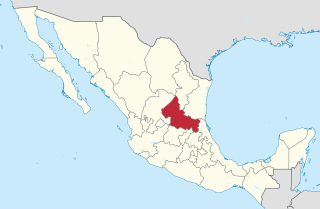
San Luis Potosí is a state in North Central Mexico that is divided into 58 municipalities. According to the 2020 Mexican census, it is the 19th most populated of Mexico's 31 states, with 2,822,255 inhabitants and the 15th largest by land area spanning 61,138.0 square kilometres (23,605.5 sq mi). The largest municipality by population is the city of San Luis Potosí, with 911,908 residents, while the smallest is Armadillo with 4,013 residents. The largest municipality by land area is Santo Domingo which spans 4,322.60 km2 (1,669.0 sq mi), and the smallest is Huehuetlán with 71.50 km2 (27.61 sq mi). The newest municipalities are El Naranjo, created out of Ciudad del Maíz, and Matlapa, carved from Tamazunchale, both established in 1994.

The Political Constitution of Colombia of 1991, is the Constitution of the Republic of Colombia. It was promulgated in Constitutional Gazette number 114 on Thursday, July 4, 1991, and is also known as the Constitution of Human Rights. It replaced the Political Constitution of 1886 and was issued during the presidency of the liberal César Gaviria, with ideas from the also liberal Luis Carlos Galán.
The Council of Ministers of the Republic of Colombia is composed of the most senior appointed politicians of the executive branch of the Government of Colombia. Members of the Cabinet are generally the heads of a Ministry Department. The existence of the Cabinet dates back to the first President Simon Bolivar. These members were appointed in order to advise the President and are therefore required to assist him in his duties as stated by the Colombian Constitution.
Prostitution in Uruguay was legislated in 2002 through the sex work law (17.515). Before that, prostitution was unlegislated but it was not illegal, since the constitution allows any activity that is not forbidden by law. Prostitution is currently not a subject of debate.
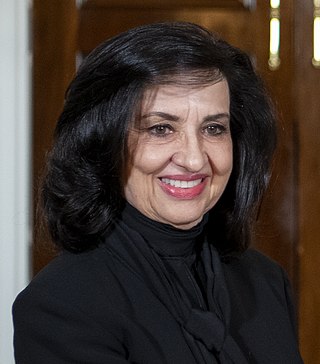
Claudia Blum Capurro is a Colombian psychologist and politician who served as foreign minister. A veteran Senator, she became the first woman to serve as President of the Senate of Colombia. She also served as the 26th Permanent Representative of Colombia to the United Nations.

Luis Gilberto Murillo Urrutia is a Colombian politician and Mining Engineer who was the Minister of Environment and Sustainable Development from 2016 to 2018. He has also served as Governor of the predominantly Afro-Colombian Department of Chocó in Colombia. Murillo was kidnapped in 2000 and after his release he went into and moved to the United States and only returned to Colombia in 2011. In July 2022, Murillo was nominated by president-elect Gustavo Petro to serve as ambassador to the United States.
There is a long and established framework for water resources management in Colombia. The Environment Ministry and up to 33 Regional Authorities, are in charge of water resources management and policies at the national and regional and watershed level, respectively. Other sectoral ministries are in charge of water demand for energy, water supply and sanitation and water for irrigation.
The Interamerican Association for Environmental Defense (AIDA) is a non-profit international environmental law organization founded in 1996 by a collaboration of five environmental organizations in the Americas including Earthjustice.
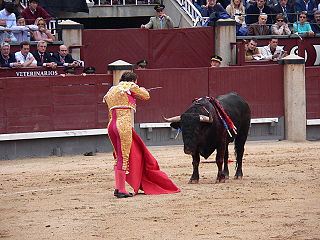
Bullfighting is a physical contest that involves a bullfighter attempting to subdue, immobilize, or kill a bull, usually according to a set of rules, guidelines, or cultural expectations.
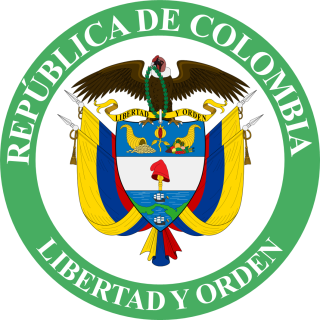
The Ministry of Environment, Housing and Territorial Development was a national executive ministry of the Government of Colombia charged with determining and regulating the standards and guidelines for the protection of the environment, the improvement and availability of potable water, and the overseeing of housing, territorial development, and sanitation.
The Ministry of Environment was the national executive ministry of the Government of Colombia charged with determining and regulating the standards and guidelines for the protection of the environment, investigate and implement environmental policies. As part of a wider cabinet reshuffle in 2002, the ministry was given the housing and land management portfolios, becoming the Ministry of Environment, Housing and Territorial Development.
Animal rights are distinguishable from animal welfare. In general, the term "animal rights" is the belief that humans do not have a right to use animals for their own purposes. "Animal welfare", on the other hand, is the belief that humans do have a right to use animals as long as the animals are treated humanely. Globally, animals have been gaining importance over the years. Particularly, in Argentina, people have also fought and continue to fight for their rights. Although many people show disinterest in animals, others fight for their protection and wellbeing. Due to the collaboration of several protectionists, both domestic and wild animals have become of great importance to Argentine society. In addition, both population and governments have put emphasis on their rights, the campaigns against animal abuses, and, essentially, the 14.346 Act that has been passed on as regards animal safety in Argentina. Furthermore, there are also different entities that specifically refer to animal rights and animal protection, either by the Argentinian government or by independent organizations; therefore, in Argentina there has been a whole mobilization from around the 1950s aimed at raising awareness among the population about the importance of animals as living beings and how fundamental it is to know about their rights and how to enforce them, since they have suffered a great deal throughout history.

Liz Chicaje Churay is an indigenous Peruvian leader who has contributed significantly to the protection of rainforests and rivers in the Loreto area of northeastern Peru, safeguarding the rights of the Yagua people. Thanks to her efforts, the Yaguas National Park was established in 2018. In January 2019 in Lima, she was awarded the Franco-German prize for human rights by the French and German ambassadors.
Guadalupe Campanur Tapia was an indigenous Mexican environmental rights activist. She was one of the indigenous leaders of Cherán who mobilize the population to defend he forest against illegal logging. In 2018, she was remembered by the UN Women.
The Ministry of Environment is the Uruguayan government ministry which oversees the environment of Uruguay.

María Susana Muhamad González is a Colombian political scientist, environmentalist and politician belonging to the Humane Colombia party. Since August 7, 2022, she has held the position of Minister of Environment and Sustainable Development of her country, in the government of Gustavo Petro.











